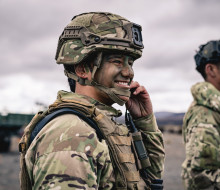
Keeping skills alive in transfer to Reserve Force
05 July 2024
Unfortunately you are viewing this website on an outdated browser which does not support the necessary features for us to provide an adequate experience. Please switch to a modern browser such as latest version of Google Chrome, Mozilla Firefox, Apple Safari or Microsoft Edge.
Ngā mihi nui
Warrant Officer of the Air Force, W/O Kerry Williams, gives his perspective on leadership in the Air Force.
Just be a good human, says W/O Williams. It’s not a complicated expectation, but if people in the Air Force practise that basic premise alongside the foundation of the service’s ethics and values then aviator skills can be built on that.
“My message to recruits is three things - step out of bed every morning and be a good human; every now and then be an even better human; and look after your mates. If they do those three things standing on our foundation of values, they can’t fall far.”
When thinking about ethos and values, W/O Williams says the service offers a pathway to shape people’s personal values to align with the Defence Force’s, which contributes to making a great team, building the ability to produce great outputs.
Translating that into Air Force life is in the actions personnel take when nobody is looking, he said.
“It’s leading by example, doing the right thing. It’s observing others and it’s calling on the value of comradeship.”
When personnel reach the level of leading leaders, that’s when the “rubber hits the road” and they are more influential in the organisation.
“I’ve always thought there was a recovery piece in there as well – if you’ve learnt some lessons after making mistakes as a junior aviator. You get into the senior noncommissioned or officer positions and you get that chance to reset and drive a positive organisational perspective based on where you fit into it,” W/O Williams said.
There can’t be a discussion about ethics and values without mentioning the Defence Force’s four core values – Tū Kaha (Courage), Tū Tika (Commitment), Tū Tira (Comradeship) and Tū Māia (Integrity). “Those four can cover off pretty much every behaviour within our space. Every value has its merit but integrity is doing what you’ve said you are going to do. It really is that piece when you’re on your own and people aren’t looking, you do the job to the best of your ability for what you’ve been tasked with doing.
“Commitment is around making some personal sacrifices, along with committing to your mates, and your role in the service. And courage – it’s tough to step up and do a lot of that stuff. So it’s the courage to demonstrate the commitment and integrity to support people in challenging and unfamiliar environments that is essential.”
Throughout his career, W/O Williams paid attention to the leadership styles he didn’t want to take on.
“It’s important to have the confidence to acknowledge good leadership in others and the courage to go out on a limb to make a difference if we have the opportunity.”
Making a behavioural change in an entrenched organisation can be difficult, but W/O Williams says he’s proud of “tidying up the language” during his time at No. 5 Squadron.
“Under my watch, unpopular at the time until people got it, was elimination of the C-bomb.”
He also asked personnel use some emotional intelligence and situational awareness before using the F-word during meetings, phone calls, and in open conversations.
“Out on the flight line with a mate, go for it, but when other people are around, some awareness of your level of language is appropriate.”
He encountered pushback from this position with complaints that staff were “walking on eggshells” all the time.
“Nobody had been brought into my office and been given a dressing-down because of their language lately – so, were they really walking on eggshells or was the plan actually working because they were checking themselves before saying something?”
There is always work to do in maintaining ethics and values in such a diverse and large organisation, he said, especially around the acceptance of social aspects of the force that can enhance the reduction of sexual harm and the use of substances and alcohol.That’s comradeship and looking after our mates.
“But we need to consider the impact of an individual’s behaviours and unwillingness for some to call out that behaviour. One thing I’d love is for our commanders and managers to have more conversations with their people and where necessary documented in their performance reviews - so there is still some work to be done in those places,” W/O Williams said.
This article was originally published as part of Air Force News, Issue 265 - Stories of Leadership in the Air Force.